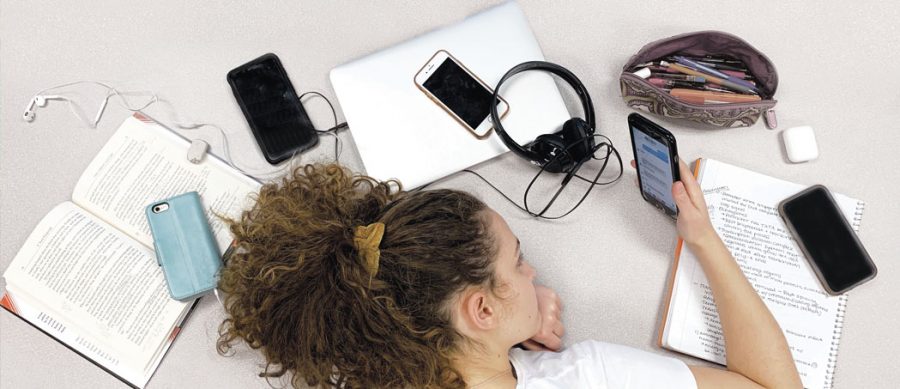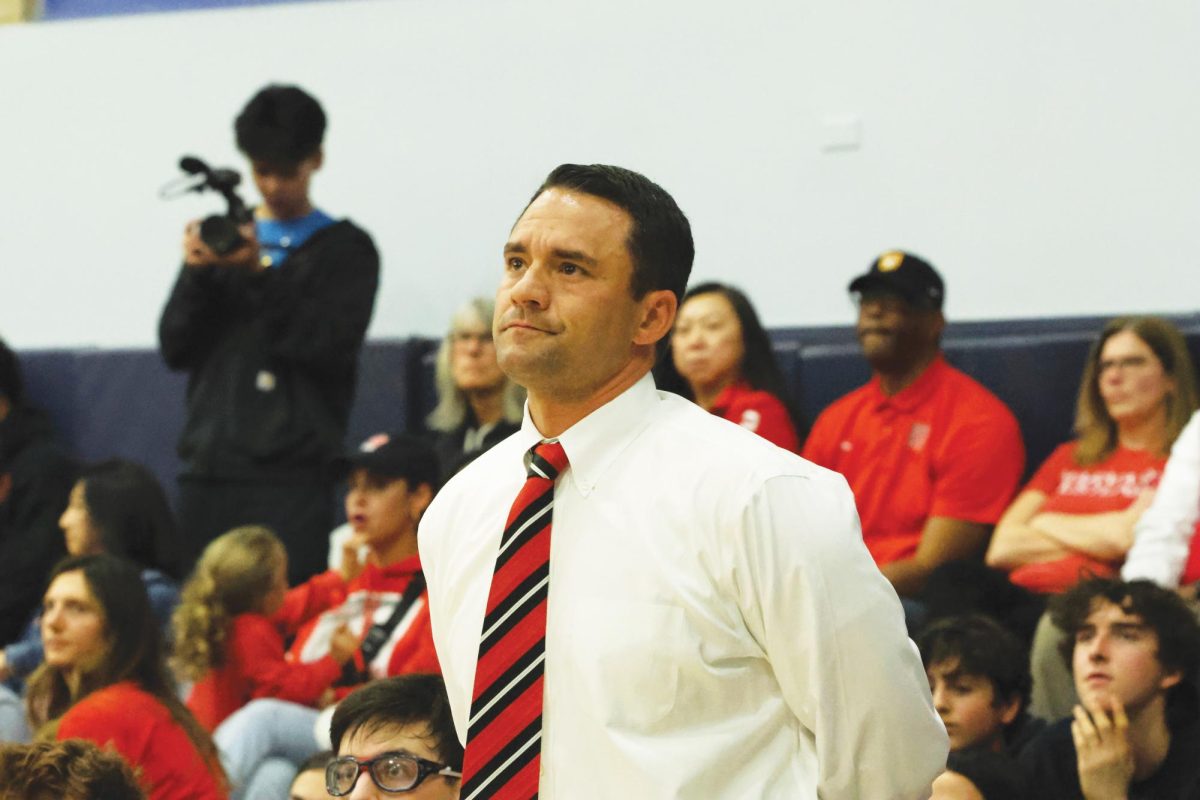Under the dim light of his desk lamp, Kevin Kroh ’20 sat restlessly, his eyes darting back and forth between his phone and his textbook. No longer able to sit still, he instinctively reached out toward his phone to check the Lakers game before glancing back at his history reading.
Kroh could not concentrate, thinking guiltily about the reading he was not doing while he watched, and wondering who scored while he read.
Kroh said that although he knows it is not the most efficient way to work, he often cannot help procrastinating by periodically reverting back to technological distractions.
“A lot of the time I do it just because the distraction is there,” Kroh said. “I know if I can just focus on my work, I’ll get it done faster and then I’ll have more time for leisure after, but I don’t think about it like that at the time.”
Dr. Jeffrey Jacobs, a psychologist and former associate clinical professor at the University of California, Los Angeles, pointed to the growth of technology in daily life as a catalyst for a more distracted generation.
“In the modern age, a student’s ability to stay focused on activities that require deep concentration is reduced because they are now accustomed to so many things going on at once,” Jacobs said.
Habits form due to what BF Skinner, a famous behavioral psychologist, called intermittent reinforcement. Skinner’s studies show that when people experience an irregular and disordered pattern of behavior on a regular basis, it becomes a subconscious tendency.
Natalie Winters ’19 said she has a different experience with multitasking. Winters noted that even though trying to do several focused tasks at once may sometimes be harmful to productivity, she can also use multitasking to her advantage.
“If I am texting friends, I don’t think there would be any reason for me to take 10 or 20 minutes entirely devoted to that since I can do work while waiting for a response,” Winters said. “I think it is much better to use any empty time possible to do other activities and maximize what I can get done.”
As the most technologically-reliant age demographic, teenagers are Silicon Valley’s prime targets for addictive features, Jacobs said.
In 2005, software engineers working at MSN invented infinite scroll, a feature that allows users to continuously swipe down to reveal more content and that is now integrated into apps such as Instagram, Facebook and Pinterest.
Three years later, Apple introduced push notifications, a new but revolutionary feature that could send messages to users while not on the app with the sole purpose of drawing users back in.
This plethora of addictive features in every app or website makes it harder to pull away from electronics, Kevin Lu ’19 said.
“The buzzing sound of a notification makes me feel like I have to check it,” Lu said. “It can get so bad that I usually have to leave my phone on another floor when I’m working.”
Learning Resource Specialist Grace Brown said meeting with and observing students to learn how they best focus, study and absorb new information has allowed her to analyze technology’s impact on the mind.
Brown said that she sees technology playing a much larger role in students’ daily lives and consequently influencing their study habits.
“There is such a dopamine hit when a phone rings, a bell goes off or lights begin flashing,” Brown said. “Technology is purposely designed to grab the user’s attention. There is something almost instinctive in today’s generation about wanting to have as much stimulation as possible.”
A popular form of multitasking is listening to music while doing homework. Several students said that they believe that while studying in crowded areas full of background noise and commotion, certain genres of music can help them focus.
“If I am doing math homework, I like to put something on in the background, something that I can enjoy and that helps me get in the zone,” Kroh said. “But if I’m reading a book for English, I feel like I need to absorb all the information I can, so I prefer silence.”
Kroh may be referring to a version of the Mozart Effect, the theory that studying while listening to some genres of music may lead to mental performance benefits, Brown said.
Unlike attention-grabbing distractions, Brown added, certain types of music can stimulate the brain and help students work.
“It is important that the music students listen to is familiar, with a somewhat predictable beat,” Brown said. “That kind of music can serve as white noise because students are not going to be distracted by the sound of a plate dropping, a person walking by or a loud car outside.”
Brown said that the multitasking phenomenon’s effect in the classroom setting can be very different based on the situation.
During normal class time, Brown said, students often feel a sense of complacency and boredom that they want to fill with distractions.
“From the students I have talked to, test taking is a completely different world,” Brown said. “It’s high stakes, the blood is pumping and there is a rush of stimulation to the brain.”
In a Chronicle poll of 264 Harvard-Westlake students, over 45 percent responded that they use their phones in class.
Winters said that when she first came to the school, she took notes on her computer, but over the last couple of years, she has tried to move away from relying on technology in class.
“Occasionally, I definitely get distracted by my phone or something on my computer [during class], and I zone out for a minute or two,” Winters said. “Even though I don’t think I miss much, it affects my confidence. During those few minutes, there could have been a crucial fact that will be on the next test or a clue about an essay question.”
History teacher Larry Klein began teaching at Harvard-Westlake 24 years ago, before smartphones and laptops were commonplace on campus.
Klein said that over the last several years, he has witnessed positive effects of technology on students, but feels that excess can lead to a dangerous addiction.
“I encourage taking computer notes in class because I think it can be very beneficial to be able to maneuver and move information around,” Klein said. “But at times, some kids are so addicted that they cannot help shopping, playing Fortnite or messaging instead of paying attention to what I am saying.”
Jacobs said that he thinks there is a path toward less distraction, but that it is unreasonable to suggest that students should abstain from all technological stimulation and solely think about work while they study.
“What seems to be successful is having a separation between work and play while keeping it as an incentive, kind of like a reward system,” Jacobs said. “But, there is not one cure-all for multitasking. Everybody is unique. Their minds, bodies and surroundings are unique, so their study habits should be unique too.”






































